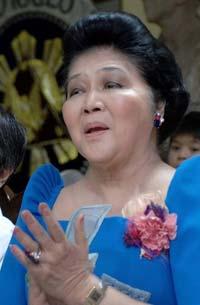Philippines’ Marcoses aim to go big in May elections

Ignoring the sweltering heat aboard the flatbed truck, former Philippine first lady Imelda Marcos led a motorcade to kick off her congressional bid in the home province of her late husband, dictator Ferdinand Marcos.
The flamboyant 80-year-old, mocked for her unbridled extravagance and 3,000 pair of shoes, said her age would not be a hindrance in serving the people.
‘I’m so excited. I never felt so energized,’ she said at the start of her campaign last week in Paoay, vowing to help make the government more sensitive and responsive to the plight of the country’s impoverished millions.
Marcos said she was also excited about the prospects of her only son, Ferdinand Junior, nicknamed Bongbong, getting elected as senator and her eldest daughter, Imee, bagging the governorship of Ilocos Norte, the northern home province of the deposed dictator.
‘I think these three marvelous [Marcoses] are all one and united to ensure that this nation will be great again,’ she told the German Press Agency dpa just before going to Paoay town, where she launched her campaign in front of the municipality’s iconic church.
She vowed to ensure that health, education and other basic services would be delivered even in far-flung villages of Ilocos Norte.
Surveys indicated the three Marcoses are headed for victories in their respective political bids, apparently shaking off the stigma of the family’s 20-year rule, which was marred by allegations of large-scale corruption and human rights abuses.
Political analysts said their rehabilitation can be attributed to the worsening state of governance in the Philippines after the family was forced into self-imposed exile in Hawaii in February 1986 by a military-backed mass uprising.
Jun Salipsip, executive director of the Institute of International and Strategic Studies, said people now admit they have not seen major improvements in their lives 24 years after the Marcoses’ removal from power.
‘People are of the impression that the situation today is worse than during the time of Marcos,’ he said.
Salipsip added that this impression was further bolstered by the failure of the government to prosecute and convict the Marcoses of alleged crimes committed during the dictator’s rule.
‘Some government officials who have been running after the Marcos ill-gotten wealth were even the ones charged with corruption,’ he said.
Many of the alleged excesses and abuses during the Marcos rule have already been forgotten as Filipinos focus on their survival amid continued widespread poverty afflicting more than a third of the country’s 90 million people, Salipsip said.
‘Our people are too preoccupied with basic physiological needs - their concern is how to feed themselves today, so they have forgotten about the past,’ he said.
Regina Raceda, a farmer and mother of four in the town of Currimao in Ilocos Norte, said the Marcoses deserve another chance in serving the country.
‘We had all kinds of leaders after Marcos was ousted, but are we better off today?’ she asked, adding that her family was a loyal supporter of the Marcoses.
‘We have to give them a chance to show what they can do to this country,’ she stressed.
Irene Marcos-Araneta, the only child of the late dictator who is not in politics, said the ‘end game’ of her family in being involved in politics was to serve the people.
‘We are here to put it all together again,’ she said, adding that her family was not particularly interested in returning to the Malacanang presidential palace, where she practically grew up.
Amid speculation that her brother could be running for the Senate as a springboard to running for president in 2016, Marcos-Araneta said public service does not necessarily mean a return to Malacanang.
‘As long as you get to serve the people, ... you do it,’ she said. ‘This family has been raised to serve the country. That’s what we are here to do, and we would like to be able to do it.’
Bongbong Marcos has said he was open to running for president but has so far made no concrete plans.
‘I would like to take this political career ... as far as it can go, and the ultimate position obviously is president,’ he said at a forum with foreign media in December. ‘But it’s not something I think about first thing in the morning when I wake up.’
Campaign heats up
Campaigning for the May 10 Philippine elections has shifted into high gear as politicians running for tens of thousands of congressional and local offices started to woo voters amid fears of an outbreak of violence.
Proclamation rallies and motorcades were launched across the Philippines for candidates competing for seats in Congress, provincial and municipal governments.
Election officials called on candidates to strictly adhere to the rules of the campaign and to avoid disputes that could result in violence between warring politicians.
Since January, 20 people have been killed in election-related violence, according to police data. The victims included candidates for local offices and their supporters.
Nearly 18,000 offices are being contested in the elections, including 222 seats in the House of Representatives, 80 provincial governors and vice governors, and 1,514 municipal mayors and vice mayors.
Among the candidates vying for seats in Congress are President Gloria Macapagal Arroyo, former first lady Imelda Marcos and seven-time world boxing champion Manny Pacquiao.
Candidates for president, vice president and senators started their campaigns in February.
More than 50 million Filipinos are registered to vote on May 10.
For the first time in Philippine elections, votes would be counted by machine and then electronically transmitted to a national server in Manila. Results could be known within hours for local contests and 48 hours for the national positions.






